|
|
|
Sort Order |
|
|
|
Items / Page
|
|
|
|
|
|
|
| Srl | Item |
| 1 |
ID:
094493
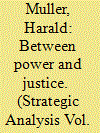

|
|
|
|
|
| Publication |
2010.
|
| Summary/Abstract |
The nuclear non-proliferation regime, despite being frequently criticised for an alleged lack of effectiveness, is in fact an amazing success story. The number of states which had conducted nuclear weapons activities in various stages but which have terminated them at one point surpasses the number of Nuclear-Weapon States (NWSs) by far. At the apex of its success, however, the regime is threatened by erosion from three different directions. A small number of rule-breakers and outsiders undermine its central objective: to stop the spread of nuclear weapons. The refusal of the official NWSs to fulfil their undertaking of nuclear disarmament violates the principle of justice enshrined in the treaty and thereby destroys its legitimacy, as does the perceived readiness by nuclear suppliers to impede the development of nuclear technology in developing countries. The Gordian Knot can presumably only be cut by a u-turn towards a world without nuclear weapons. This insight has meanwhile reached the mainstream security establishment of the United States, the president included. Whether this road will really be taken will determine the future of the regime-with far-reaching consequences for global security.
|
|
|
|
|
|
|
|
|
|
|
|
|
|
|
|
| 2 |
ID:
094496
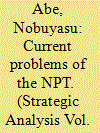

|
|
|
|
|
| Publication |
2010.
|
| Summary/Abstract |
With the 'world without nuclear weapons' speech by President Obama and the other moves, indications are good for the next Nuclear Non-Proliferation Treaty (NPT) Review Conference. Progress has to be made on the Comprehensive Test Ban Treaty (CTBT), the proposed fissile materials cut-off treaty (FMCT), Negative Security Assurance (NSA), and reducing the role of nuclear weapons. On the non-proliferation side, the Additional Protocol must be made a standard, the International Atomic Energy Agency (IAEA) strengthened, and NPT withdrawal acted on decisively. To avoid the threat of nuclear terrorism, a series of measures has to be applied with perseverance. The only realistic way to address the Middle East question is to proceed in parallel on regional peace and the region free of weapons of mass destruction (WMD).
|
|
|
|
|
|
|
|
|
|
|
|
|
|
|
|
| 3 |
ID:
094562
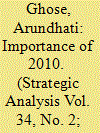

|
|
|
|
|
| Publication |
2010.
|
| Summary/Abstract |
In international relations, the more powerful have a way of underplaying history or overemphasising it, depending on how helpful or otherwise it may be in promoting their immediate objectives. It is interesting to note that even a country like India, which is beginning to sense the stirrings of power, is tending to fall into the same pattern. While this may be generally true, the expressions of power in the context of the non-proliferation of nuclear weapons, as becomes evident from an assessment of the five yearly Review Conferences of the Nuclear Non-Proliferation Treaty (NPT), have been more pronounced than perhaps in any other area of international relations.
|
|
|
|
|
|
|
|
|
|
|
|
|
|
|
|
| 4 |
ID:
094501
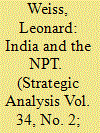

|
|
|
|
|
| Publication |
2010.
|
| Summary/Abstract |
India's nuclear development has been accompanied by a dual track strategy of developing and building weapons while criticising the non-proliferation regime as discriminatory and simultaneously making public statements and proposals in favour of nuclear disarmament. But with international progress likely on aspects of nuclear disarmament over the next few months, India will be in the spotlight at the forthcoming 2010 Non-Proliferation Treaty (NPT) Review Conference to help move the disarmament and non-proliferation agenda forward. This article proposes that India meet this challenge by announcing specific commitments on permanently ending nuclear testing and plutonium production for weapons by a set date. In the course of reaching this conclusion, the article traces the history of India's role in the development of the international non-proliferation regime, its proposals on disarmament, and also its relationship with the United States with respect to India's nuclear development and ambitions.
|
|
|
|
|
|
|
|
|
|
|
|
|
|
|
|
| 5 |
ID:
094502


|
|
|
|
|
| Publication |
2010.
|
| Summary/Abstract |
Before India came out openly as a nuclear-armed state, it could find, in many quarters, sympathy-if not actual support-for its disdainful stance toward the NPT. Since the indefinite extension of the NPT and India's nuclear test explosions, nothing whatsoever is gained by remaining aloof from the NPT community which is, for all intents and purposes, the rest of the world. Without formally adhering to the treaty, India should embrace it wholeheartedly and be an exemplary nuclear-weapon state, showing the way ahead for the treaty's nuclear-weapon states. Such great policy shifts are rare, but this would be fully in line with the India's most basic values.
|
|
|
|
|
|
|
|
|
|
|
|
|
|
|
|
| 6 |
ID:
094503
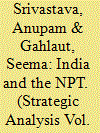

|
|
|
|
|
| Publication |
2010.
|
| Summary/Abstract |
This article examines the feasibility and advisability of India joining the Non-Proliferation Treaty (NPT). It demonstrates that (a) the non-proliferation regime, which is larger and more varied than the NPT, has received significant cooperation from India in the past; (b) that in order to effectively deal with future challenges from nuclear renaissance, nuclear deterrence, and terrorism, the regime will need to craft creative, non-NPT centric solutions like the US-India nuclear agreement, to co-opt India; and (c) that India's interest will be better served by trying to shape the regime from within rather than remaining a reasoned voice from without.
|
|
|
|
|
|
|
|
|
|
|
|
|
|
|
|
| 7 |
ID:
094505


|
|
|
|
|
| Publication |
2010.
|
| Summary/Abstract |
In different international bodies and in statements by various world leaders, universalisation and a possible revision of the Nuclear Non-Proliferation Treaty (NPT) are figuring quite frequently. Certainly, in the emerging context for universalisation, the relationship between India and the NPT may be reviewed. Several relevant options are emerging to define the relationship between India and the NPT. This has put the relationship between India and the NPT in the international limelight. As no Indian government can ever be in a position to join the NPT as a non-nuclear weapon state (NNWS), the international community should adopt a realistic approach to bring India into the NPT. And this can only be as a nuclear weapon state (NWS).
|
|
|
|
|
|
|
|
|
|
|
|
|
|
|
|
| 8 |
ID:
094500
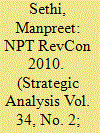

|
|
|
|
|
| Publication |
2010.
|
| Summary/Abstract |
Amongst the challenges that bedevil the Non-Proliferation Treaty (NPT) today, the NPT Review Conference (RevCon) 2010 will have to particularly handle two issues: one, right of non-nuclear weapon states (NNWS) under Article IV over the entire nuclear fuel cycle; two, identification by nuclear weapon states (NWS) of credible moves under Article VI for realising disarmament. In addressing the two interlinked issues, the RevCon has an opportunity to refocus the 40-year-old treaty into an effective instrument of non-proliferation and disarmament-its original twin objectives. The article also recommends the role that India can play in helping the NPT overcome its challenges. As a non-member, India has no direct stake in the treaty, but non-proliferation is an objective that furthers India's national security.
|
|
|
|
|
|
|
|
|
|
|
|
|
|
|
|
| 9 |
ID:
094498


|
|
|
|
|
| Publication |
2010.
|
| Summary/Abstract |
This article lists the major issues before the 2010 Non-Proliferation Treaty (NPT) Review Conference and goes into the politics behind them. It concludes that as long as the treaty remains iniquitous, it will not be able to prevent nuclear proliferation. The forthcoming nuclear summit in April 2010 provides an opportunity for all countries to work towards a nuclear weapons convention, which outlaws nuclear weapons and promotes genuine nuclear disarmament.
|
|
|
|
|
|
|
|
|
|
|
|
|
|
|
|
| 10 |
ID:
094564


|
|
|
|
|
| Publication |
2010.
|
| Summary/Abstract |
Disarmament, especially nuclear disarmament, has long been a dream of world ever since it witnessed the horrors of the effects of its use in the Second World War. Nuclear disarmament is likely to be the centre of debate at the forthcoming NPT Review Conference.
|
|
|
|
|
|
|
|
|
|
|
|
|
|
|
|
| 11 |
ID:
094495
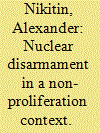

|
|
|
|
|
| Publication |
2010.
|
| Summary/Abstract |
The expiry of the Strategic Arms Reduction Treaty-1 (START-1) in 2009 and an urgent need to conclude a new US-Russian agreement on strategic nuclear weapons so that the oldest and biggest nuclear powers demonstrate some progress in implementing Article 6 of the Non-Proliferation Treaty (NPT) in proximity of the 2010 NPT Review Conference has drawn international attention to the interface between the progress/crisis in nuclear disarmament and strengthening/weakening of the NPT regime. This article analyses major past and potential future steps in Russian-US nuclear arms reductions, in dealing with excessive fissile materials, in preventing weapons of mass destruction (WMD) terrorism, and in their interconnection with the non-proliferation tasks.
|
|
|
|
|
|
|
|
|
|
|
|
|
|
|
|
| 12 |
ID:
094499


|
|
|
|
|
| Publication |
2010.
|
| Summary/Abstract |
Despite groundbreaking disarmament pledges and substantial effort, the Obama administration's hopes for a successful Nuclear Non-Proliferation Treaty (NPT) Review Conference may not be fully realised. Many developing countries are in no mood to grant new non-proliferation concessions, such as tightened rules on access to sensitive nuclear technologies, tougher inspection rules, or limits on withdrawing from the treaty. The non-nuclear weapon states (NNWS) remain angered by the failure to move forward on many disarmament commitments pledged at the 1995 and 2000 Conferences. Moreover, progress on disarmament measures under Obama has been slower than hoped, as he faces considerable scepticism in Washington about his strategy.
|
|
|
|
|
|
|
|
|
|
|
|
|
|
|
|
| 13 |
ID:
094563
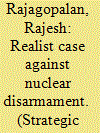

|
|
|
|
|
| Publication |
2010.
|
| Summary/Abstract |
Nuclear disarmament is once again fashionable. If rhetoric was sufficient, nuclear disarmament should be easily achievable. But what the rhetoric hides is not only the difficulty of achieving nuclear disarmament, but also the instrumental manner in which that rhetoric is being deployed. At the height of the Cold War, the two superpowers traded a number of detailed proposals for controlling the atom. Much later, Paul Nitze, one of the key participants on the US side, revealed that most of these proposals were deliberately designed to be rejected and were proposed as public relations gimmicks rather than as serious diplomatic positions.1 One can say the same about the current overheated buzz about nuclear disarmament: as in the 1950s, this is designed to serve specific policy goals that are related to nuclear non-proliferation and other nuclear arms control measures rather than nuclear disarmament.
|
|
|
|
|
|
|
|
|
|
|
|
|
|
|
|
| 14 |
ID:
094504
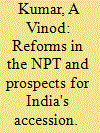

|
|
|
|
|
| Publication |
2010.
|
| Summary/Abstract |
Since its indefinite extension in 1995, the Non-Proliferation Treaty (NPT) has been on the sidelines, with its utility eroding in the post-Cold War security environment, as new instruments took over the anti-proliferation mantle. Being the cornerstone of the regime and near-universal in character, the NPT has nonetheless survived despite a host of challenges threatening its existence. Its future, however, is imperilled unless the member states take remedial actions, including a restructuring of the treaty to suit 21st century requirements. Such structural reforms should meet new challenges as well as redress existing shortcomings, including the means to ensure total universalisation.
|
|
|
|
|
|
|
|
|
|
|
|
|
|
|
|
| 15 |
ID:
094565


|
|
|
|
|
| Publication |
2010.
|
| Summary/Abstract |
President Barack Obama's insightful speech on April 5, 2009, in Prague portends significant changes in the US policy approach towards arms control and nuclear disarmament.1 Obama's enlightened statement has kindled hopes that mankind is nearing a turning point since its tryst with the nuclear bomb. Much of this will depend enormously on our past experiences with the bomb since it was first dropped on Hiroshima and Nagasaki in 1945. Michael Krepon's excellent book Better Safe than Sorry: The Ironies of Living with the Bomb says that instead of overblowing the threat of a nuclear armageddon, it is important that the policy-makers secure nuclear materials from falling into the wrong hands.
|
|
|
|
|
|
|
|
|
|
|
|
|
|
|
|
|
|
|
|
|